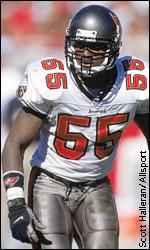
| ||||||||||||
| ESPN.com NFL | ||||
 | Monday, December 6 Bucs make case for defense Special to ESPN.com | |||
More than ever this season, NFL teams have had their fates determined exclusively by their quarterbacks.
 | |
| Derrick Brooks and the Bucs defense are very good, but they will need help from the offense. |
This growing pool of evidence leads to one inescapable conclusion. In the 1990s, there are two things an NFL team with Super Bowl intentions absolutely, positively has to have: A) a quarterback who is playing, and B) a quarterback who is playing well.
Without both, you're no better than the Bengals, Eagles or, worst of all, the 49ers.
Unless, of course, you're the Tampa Bay Buccaneers.
Of the seven teams currently on the plus side of .500 in the NFC playoff race, the Buccaneers have the shakiest quarterback situation. And that's when they're healthy, which, right now, they're not.
"Obviously, the team that gets the best quarterback play has a heck of an advantage," Bucs coach Tony Dungy said. "But I think you're dealing with teams, too, that aren't necessarily built all around the quarterback. They have other things that help them win."
Yes, but can those other things help them win it all?
The Buccaneers are on a roll, having won four consecutive games, and they're looking at a favorable remaining schedule, so a playoff berth appears likely. However, there is serious doubt about whether the run-oriented, defense-minded Bucs can beat the high-powered offensive teams they will meet in the playoffs, especially now that rookie Shaun King has replaced the injured Trent Dilfer at quarterback.
The NFC's current ruling class, if you can call it that, is loaded with offense-first teams. The Rams, Redskins, Vikings and Packers are all cut from the same cloth -- a versatile, explosive offense and a defense that needs a high-scoring offense to mask its weaknesses. Those are the teams Tampa Bay will likely meet in the NFC playoffs.
If the Bucs do eventually play one or more of them, it will be a litmus test for Tampa Bay's old-school approach to football. Now in their fourth season under Dungy, the Bucs are the pre-emminent defense-first team in the NFL. Whereas the Rams and Vikings think of 17-14 as a first-quarter score, the Bucs will take a victory by that score and go home happy.
"It's like we're trying to set football back," Dungy said.
The Buccaneers will have to set it back a long way in order to be legitimate Super Bowl contenders. They have the NFL's 26th-ranked offense and its second-ranked defense, which is simply not a formula for playoff success in the offense-dominated NFL of the 1990s.
In the last eight years, no team has won the Super Bowl with an offense that ranked worst than fifth in yards gained. In the last 15 years, only two Super Bowl champions -- Bill Parcells' Giants of 1986 (10th) and 1990 (17th) -- have been ranked worse than seventh in total offense. The Buccaneers could average 400 yards over their final five games and still wouldn't move up to 17th.
It also takes a good defense to win the Super Bowl. Over the last eight years, the average defensive rank for the NFL champion was sixth, with a low of 11th. However, it has become a truism in the league that offense wins championships. Over those same eight years, the average offensive rank for the NFL champion was 3.5.
That means that no matter how good their defense is, offensively challenged teams have difficulty keeping up with teams that score a lot of points. The Buccaneers, who rank ninth in rushing but only 28th in passing, are definitely challenged offensively. They have scored 15 offensive touchdowns this season, eight below the NFL average and better than only the 49ers, Eagles and Cardinals. It's also one less than Redskins running back Stephen Davis has scored all on his own.
Traditionally, Dungy's Bucs have had trouble beating explosive offenses. Since they emerged as a top-five defensive power in 1997, the Bucs' record against teams with offenses ranked in the NFL's top 10 is 5-10.
That includes a 1-2 mark this year, when they lost to the Vikings 21-14, and the Packers 26-23. Those are the only two opponents to score more than 20 points on the Buccaneers this year.
Although their unit is ranked second behind Jacksonville's, a case can be made that the Buccaneers have the NFL's most dominant defense. It has surrendered only 10 touchdowns -- a league low -- in 11 games. It has allowed no more than a field goal in four of its 11 games.
The Buccaneers have won two games this season in which their offense failed to score a touchdown. They won one game despite committing six turnovers, another when they allowed seven sacks.
"I think throughout the year we've played really solid, solid defense, minus a couple games," Tampa Bay safety John Lynch said. "I think the first Minnesota game and Green Bay come to mind as the games where we didn't play up to our expectations. The one thing, however, through the beginning of the season that we didn't have going is the turnovers. Now through the last couple of weeks we've got that going, and that makes us even better. I think we're playing some extremely good football."
Despite its impressive defensive numbers, Tampa Bay doesn't fit the profile of an NFL champion because it lacks a high-powered passing game and struggles to score more than 17 points a game.
A run-oriented team hasn't won the Super Bowl since the 1990 Giants. Since then, it has been the exquisitely balanced Cowboys or a West Coast offensive team such as the 49ers, Packers or Broncos who have won titles. You might also note that the Cowboys, 49ers, Packers and Broncos all had quarterbacks who won NFL or Super Bowl MVP awards.
King, a second-round draft pick from Tulane, will be making his first NFL start Monday night against the Vikings. With such an inexperienced quarterback starting for Tampa Bay, this game could be the ultimate test as to whether defense can still win championships.
"We have such a good defense and such good running backs and wide receivers, if I play smart, we'll be fine," King said.
That sounds like the job description the Buccaneers have always had for Dilfer: Just stay out of the way of the defense; don't turn the ball over and we'll be fine. But while that philosophy has made the Bucs contenders under Dungy, it hasn't made them champions.
Sooner or later, the Buccaneers will need some help from the offense. That was a question mark with a healthy Dilfer. Now that he's out, perhaps for the rest of the season, it's even more unlikely that the defense will get much-needed assistance.
If King can overcome his inexperience by becoming a playmaker at quarterback, the time to do it is against the Vikings. That's because Minnesota, ranked fourth in the NFL on offense and 30th on defense, is exactly the type of team the Buccaneers will have to beat in the playoffs.
"People love to see a matchup of defense versus offense" Vikings coach Dennis Green. "And that normally means that other people are going to be a factor. ... It's going to come down to what our defense can do against their offense."
The Buccaneers offense has scored more than 17 points only four times this season, all against defenses ranked 22nd or below. Fortunately, it will be facing similarly ranked defenses in the playoffs. Unfortunately, those defenses will be paired with offenses that can score more than that, even against the Buccaneers.
Cards up off the deck
The Cardinals have been reborn, winning three consecutive games against playoff contenders, but at 5-6 still have a long way to go to get back in the playoff chase.
In beating the Lions, Cowboys and Giants, Arizona is starting to look like the team that went to the second round of the playoffs last year. However, the Cardinals still trail two teams -- Washington and Dallas -- in the East and stand eighth in the race for six NFC playoff spots.
"When we were 2-6, we kept our heads up," said quarterback Jake Plummer, who returned from a four-week injury absence to throw two second-half touchdown passes and lead the Cardinals to a 34-24 road victory over the Giants on Sunday. "We kept together as a team. That's a tribute to the character of these guys. They were supportive of each other. Every week we're getting better."
More than character, though, it's been fewer turnovers and more healthy bodies that have fueled the Cardinals' surge.
Arizona committed only four turnovers in its three-game winning streak after having 23 in its first eight games. Plummer, who threw 14 interceptions in the first six games, didn't have any in his return last week.
Besides getting Plummer back, the injury-ravaged Cardinals have also welcomed the return of defensive tackle Eric Swann, who has always been the difference between a good Arizona defense and a great one. Better yet, halfback Michael Pittman and defensive end Andre Wadsworth are expected to be back soon.
Healthy or not, the Cardinals have a long way to go to reach the playoffs. If they're going to be a player in the weak NFC East, they're probably going to have to win a cold-weather game at Washington (Dec. 12) or Green Bay (Jan. 2) before it's all over.
Cowboys taking the hard road
In the marathon that is the NFL season, the Cowboys are the hare while the other NFC contenders are tortoises.
Despite making the playoffs every year but one, the Cowboys have compiled a winning record in December only once in the last five years. That means they've usually backed into the playoffs.
Now, the Cowboys are having the same problem in road games.
Since an overtime win in the opener at Washington, they have lost five consecutive games away from Texas Stadium. Amazingly, they led each of those games -- by scores of 17, 14, 10, seven and three points -- before falling apart at the end. In those 10 third and fourth quarters, the Cowboys were outscored, 81-16.
"We're just not finishing the job on the road the way we have at home," coach Chan Gailey said.
The Cowboys, who play at New England Sunday, have lost nine straight road games to teams outside the NFC East.
Rams a well-balanced act
All anyone wants to talk about is the Rams offense, and why not? It ranks second in the NFL in total offense and first in points scored.
But, lately, the Rams defense is starting to make a name for itself, too.
St. Louis hasn't allowed a point in the second half since losing to Detroit on Nov. 7. The Rams have outscored the opposition 52-0 in the second half over the last three games and have a 162-51 edge in points for the season during the final two quarters.
"Eventually, our talent shows up, our speed shows up and our power shows up," coach Dick Vermeil said. "You wear them down."
It doesn't hurt that the offense has forced the Rams' opponents to play from behind all season, either.
Tom Oates of the Wisconsin State Journal writes a weekly NFC column that appears every Thursday during the regular season.
|
ESPN INSIDER
Copyright 1995-99 ESPN/Starwave Partners d/b/a ESPN Internet Ventures. All rights reserved. Do not duplicate or redistribute in any form. ESPN.com Privacy Policy. Use of this site signifies your agreement to the Terms of Service. | ||||
 Mort Report: Sherman marches on
Mort Report: Sherman marches on